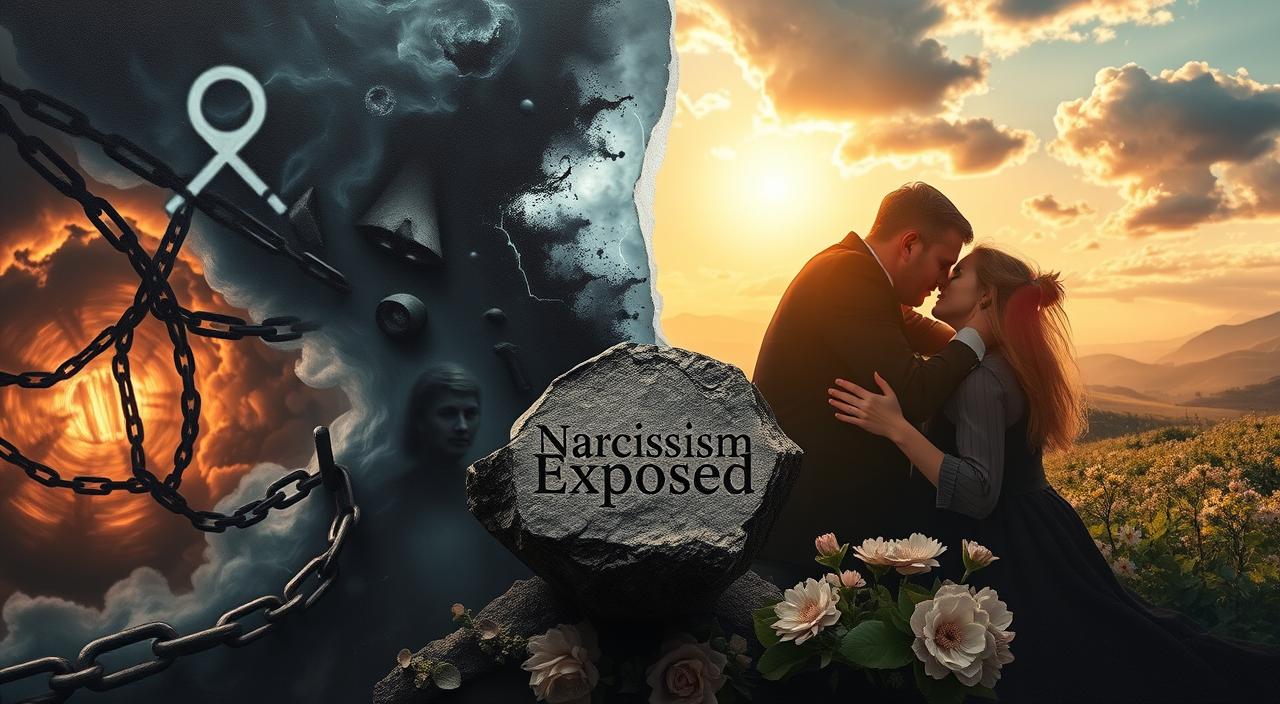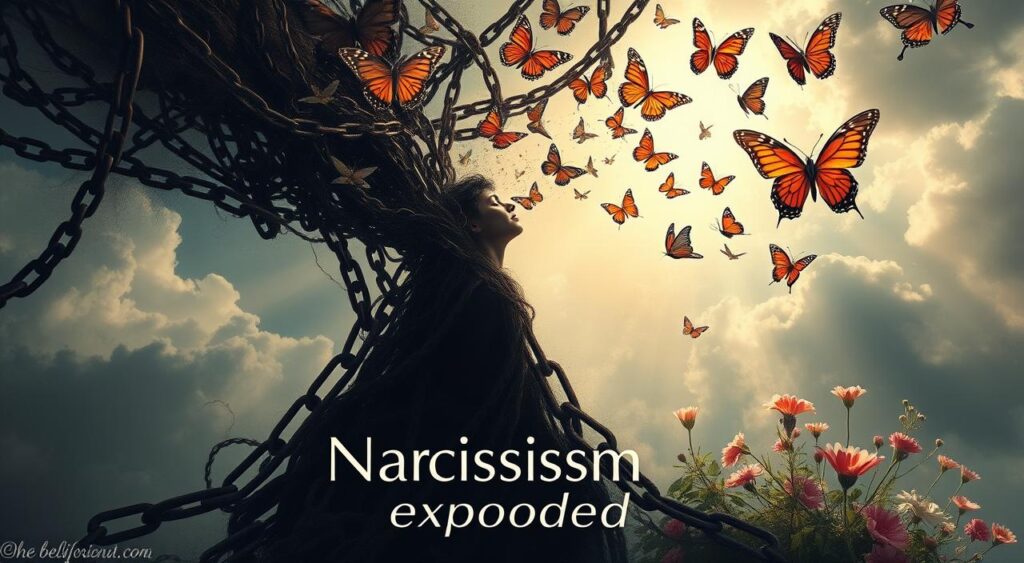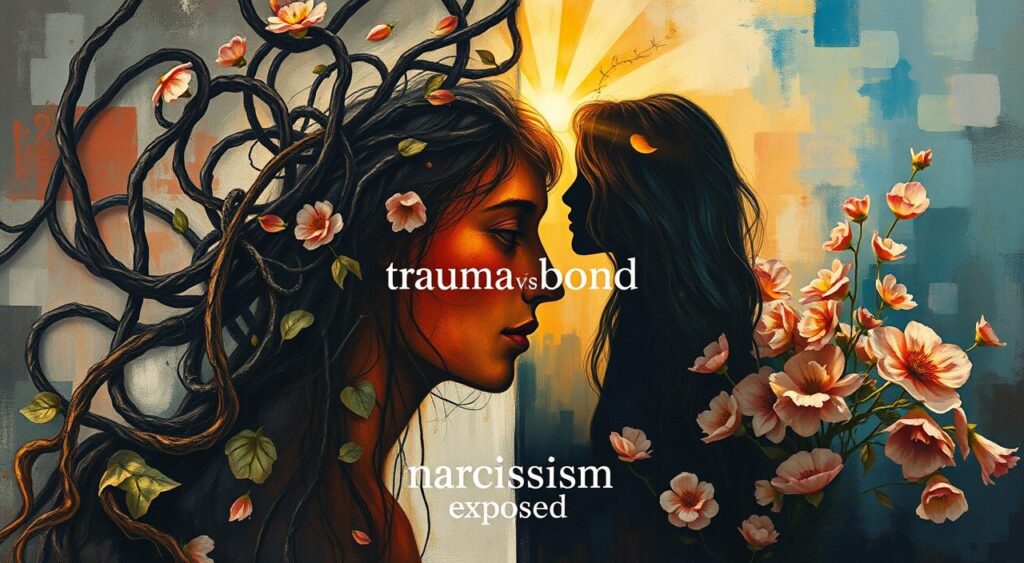I’ve learned a lot from my past, especially about how relationships affect us. For a long time, I was stuck in a cycle of trauma bonds. I couldn’t tell the difference between real love and the toxic patterns in my life1. This journey was hard, leaving me feeling alone, anxious, and exhausted. Let’s discuss trauma bond vs love.
But, this hard time taught me a big lesson. I learned the key difference between trauma bonds and the positive, empowering bonds of love1. Now, I want to share my story and highlight this important difference. I hope it helps others break free from trauma and find the strength to love in a healthy way.
Key Takeaways
- Trauma bonds and love are fundamentally different emotional experiences, with distinct characteristics and consequences.
- Trauma bonds are often formed in abusive or harmful relationships, characterized by fear, loyalty, and dependency1.
- Love, in contrast, is marked by feelings of affection, care, and deep attachment, fostering mutual respect, support, and personal growth1.
- Breaking free from a trauma bond can be challenging, as individuals may fear abandonment or the unknown1.
- Healthy love contributes to emotional well-being and supports positive relationships, while trauma bonds can lead to mental and physical health issues1.
What is a Trauma Bond?
A trauma bond is a strong, unhealthy emotional tie that forms between a person and their abuser. This phenomenon is common in situations like domestic violence, emotional control, or long-term trauma2.
Trauma bonds make victims feel like they’re on an emotional rollercoaster. They go through ups and downs of abuse and being shown love by their abuser. This back-and-forth can create a strong, harmful bond that’s hard to escape2.
Characteristics of Trauma Bonds
- Emotional Rollercoaster: Trauma bonds bring constant emotional ups and downs. Victims go through abuse and then feel loved and cared for by their abuser.
- Intermittent Reinforcement: The abuser’s random acts of kindness and affection create a strong, unhealthy bond. It’s like the effects of intermittent reinforcement in behavioral psychology.
- Difficulty Breaking Free: Trauma bonds are hard to break because the abuser has a strong psychological and emotional grip on the victim. This can make victims feel loyal, confused, and see the relationship differently.
It’s important to understand trauma bonds to keep relationships healthy and yourself safe2. Knowing what these bonds are helps people seek help and escape abuse and manipulation3.
“Trauma bonds can happen in any relationship, not just romantic ones. They can be in work, family, neighborhoods, or online.”2
What is Love?
Love is a deep feeling that comes from care, mutual respect, and affection for someone else. In a healthy love relationship, both people feel supported and valued. They can be their true selves. Love is built on trust, open talk, and wanting each other to grow and be happy4.
True love is different from trauma bonds. It’s about giving and respecting each other equally5. In a good relationship, partners care for each other, support each other, and talk openly and honestly5.
“Love is not a state of perfect caring. It is an active noun, like ‘struggle.’ To love someone is to strive to accept that person exactly as he or she is, right here and now.”
– Fred Rogers
While trauma bonds are based on control and hurt, love is about understanding, trust, and growing together5. In a healthy relationship, both people can be themselves. They share their needs and feelings freely, without fear5.
Love is complex and needs work, talking, and respect. Knowing the difference between trauma bonds and love helps people choose better relationships45.
Key Differences Between Trauma Bond vs Love
The main difference between trauma bonds and love is their roots, feelings, and how dependent they make us. Trauma bonds come from shared bad experiences and fear. Love, however, is built on respect, care, and affection6. Trauma bonds have intense highs and lows7, while love brings happiness, contentment, and security.
Foundation
Trauma bonds often start in relationships where one person controls and manipulates the other through abuse4. This creates a fake sense of attachment and loyalty6. Love, on the other hand, grows naturally over time. It’s based on mutual understanding, respect, and shared experiences.
Emotional Experience
Trauma bonds have unpredictable emotional ups and downs, with fear and affection leading to an unstable bond4. Love, however, brings a sense of security, trust, and emotional stability7.
Dependency vs. Independence
In a trauma bond, there’s a strong need for the abuser6. Love, on the other hand, supports independence and personal growth7. Trauma bonds can make you lose your identity and become overly dependent7. Love lets partners keep their own identity and support each other’s growth.
Loyalty vs. Respect
Trauma bonds make you loyal to an abuser despite the harm they cause6. Love is based on mutual respect and wanting the best for each other7. In healthy relationships, both partners have equal power and talk openly7. Trauma bonds often have a power imbalance and poor communication4.
Knowing the differences between trauma bonds and love helps us spot unhealthy patterns and build real, fulfilling relationships. Healthy relationships should feel safe and help us see the warning signs in toxic ones.
Trauma bond vs love: Understanding the Impact
Trauma bonds can deeply affect a person’s life8. Those caught in a trauma bond feel ongoing emotional pain, marked by fear, anxiety, and doubt8. They often lose touch with friends and family as they rely more on their abuser8. Trauma bonds can also hurt a person’s self-worth, making them feel not good enough8.
The stress from a trauma bond can lead to health problems like anxiety, depression, and physical issues8. Attachment theory shows that early trauma, like abuse or neglect, makes it harder to spot and fight against abuse later on8
Trauma bonding involves a cycle of abuse, where the abuser goes from devaluing to positively reinforcing the victim, creating a strong bond9. This bond makes victims defend their abusers and downplay the abuse they face, due to the deep emotional tie9. The abuser’s mixed behavior in a trauma bonding relationship makes it hard for the victim to leave, even if the relationship is bad9.
Trauma bonding can severely affect a person’s health and well-being, causing deep emotional wounds that may take a long time to heal. Trauma bonding is the strong attachment an abused person feels for their abuser in a cycle of abuse9
“Trauma bonds often result in survivors defending the abuser and downplaying the severity of the abuse experienced due to the intense emotional connection formed.”9
It’s important to know the signs of a trauma bond and get help to escape its grip. Understanding trauma bonds helps people take steps to improve their health, build their self-esteem, and gain back their independence89.
Breaking Free from Trauma Bonds
Getting out of a trauma bond is hard but key to healing. Trauma bonding is like Stockholm Syndrome, making you feel close to an abusive partner. This makes it hard to leave10. But, with support and strategies, you can break free from this toxic cycle.
Seeking Professional Help
Getting help from a therapist or counselor is very helpful10. They can help you understand your relationship and set healthy limits. They also help you rebuild your self-worth.
Building a Support Network
Having a strong support network is key11. This includes friends, family, and groups that get what you’re going through. Sharing your story with others who understand can make you feel less alone. It gives you the courage and help you need to heal.
Remember, leaving a trauma bond is tough but vital for your life10. With support and willpower, you can move past abuse. You can find love, respect, and empowerment in a new future.
The Importance of Healthy Love
Healthy love can deeply change a person’s life2. It makes us feel happy, content, and safe2. It helps us grow and become our best selves2. It also gives us the strength to overcome challenges with hope2.
Love also boosts our health, lowering stress and cutting down on depression and anxiety2. Healthy relationships mean feeling safe, respected, and secure2. Being able to talk openly without fear is key2.
These relationships value being independent yet connected2. It’s important to set clear boundaries2. Moving from a toxic to a healthy relationship takes work but is worth it2.
Creating healthy bonds leads to self-discovery and lasting friendships2. For those looking to improve their relationships, coaching and webinars are great resources2.
“The greatest gift we can give one another is the gift of unconditional love and acceptance.” – Melinda Gates
In summary, healthy love is vital. It boosts emotional health, supports growth, and builds strong connections. By embracing healthy love, we gain physical and mental health benefits, making life more rewarding2. Learn more about the power of healthy love and how to build it in your life2
Trauma Bond vs Love: Recognizing the Difference
It’s key to know the difference between a trauma bond and real love for healthy relationships and emotional health. Both can feel intense, but they’re very different2.
Signs of a trauma bond include feeling an emotional rollercoaster, being very dependent on the abuser, and staying loyal even when hurt1. Love, on the other hand, means respecting each other, supporting each other, and wanting the other to be happy and grow1.
Trauma bonds often happen in relationships where people have faced instability or trauma before2. These people might be drawn to those with problems because it feels familiar, not because they truly connect2. Healthy relationships focus on respect, setting and respecting boundaries, and supporting each other’s independence and togetherness2.
Feeling anxious in a relationship could mean it’s a trauma bond, not true love. It’s a sign to get help or talk to a trusted friend.2
Moving from a trauma-bonded relationship to a healthy one takes work from both sides. It can lead to personal growth and more stable relationships2. Getting out of a trauma bond is hard but can be done with help from professionals like therapists and counselors1.
“Healthy love helps with emotional well-being, support, growth, resilience, positive relationships, and better physical and mental health.”1
Resources and Support
If you or someone you know is dealing with a trauma bond or wants to improve healthy, loving relationships, there are many resources and support services out there. National organizations like the National Domestic Violence offer confidential help and links to local support12. Also, mental health professionals and therapists who focus on trauma, abuse, and relationship dynamics can offer great advice and support13.
To overcome trauma bonds, it’s important to take care of yourself, stop dreaming about your partner changing, and be honest about the abuse patterns13. Signs of traumatic bonding include thinking about past abusers too much, staying in touch with those who hurt you, seeking approval from people who are not reliable, and staying loyal to those who have betrayed you13.
Trauma bonds often happen in situations of abuse, manipulation, or deep personal trauma, studies show14. Getting out of these bonds usually requires professional support and a dedication to healing14.
On the flip side, healthy and mutual love can make people feel happy, fulfilled, and emotionally secure14. Love helps people grow, become more resilient, and feel like they belong in their relationships14.
Knowing the signs of trauma bonding helps people spot unhealthy patterns in their relationships and get help from trusted sources14. This important step can help end the cycle of abuse and lead to healthy, fulfilling relationships14.
Remember, you deserve a relationship based on trust, respect, and mutual understanding. With the right resources and support, you can escape the trap of a trauma bond and find the true meaning of love14.
Getting help from domestic violence resources, mental health professionals, and building a supportive network are the first steps towards healing and creating healthy relationships14.
Conclusion
Understanding the difference between trauma bonds and love is key in relationships. Trauma bonds, often seen as obsessive love, can harm our emotional health15. Knowing the differences helps us build better, healthier relationships15.
Healing from trauma bonds means getting help, building a support network, and caring for ourselves1617. On this path, we learn to value our emotional health and well-being1617.
Breaking free from trauma bonds leads us to real, true love1617. It’s not just about learning; it’s about healing and growing. With the right support and care, we can move past trauma bonds to find love that’s real and true1617.
The difference between trauma bonds and love is crucial for our emotional health and growth1516. By understanding and healing from trauma bonds, we can build relationships that support our well-being and happiness1516.
FAQ
What is the difference between a trauma bond and love?
Trauma bonds form when a person feels deeply connected to someone who hurts them. This bond swings between feeling loved and being abused. Love, on the other hand, is about caring for someone deeply. It’s built on trust and wanting the other person to be happy.
What are the key characteristics of a trauma bond?
Trauma bonds start from shared scary experiences and fear. They bring big ups and downs in feelings. People often feel stuck to their abuser, even when they’re hurt.
What are the characteristics of a healthy love relationship?
Healthy love means respecting each other and talking openly. It’s about wanting the other person to be happy and grow. This kind of love makes people feel happy, secure, and supports their independence.
How do trauma bonds and love differ in their foundations and emotional experiences?
Trauma bonds come from scary times and fear. Love is based on respect and caring. Trauma bonds have big emotional ups and downs. Love brings happiness and security.
What are the impacts of a trauma bond on an individual’s well-being?
Trauma bonds can really hurt a person’s mental and physical health. They cause emotional ups and downs, fear, and feeling alone. This can lead to anxiety, depression, and other health problems.
How can someone break free from a trauma bond?
Getting help from professionals like therapists is key to breaking a trauma bond. Having a strong support network of friends and family helps too. They offer emotional and practical help during recovery.
What are the benefits of healthy love relationships?
Being in a healthy love relationship makes you feel good emotionally. It helps you grow as a person and supports you in tough times. Love is also good for your health, lowering stress and helping with depression and anxiety.
How can someone recognize the signs of a trauma bond vs. a healthy love relationship?
Look for a trauma bond if you feel like you’re on an emotional rollercoaster with someone. If you’re too dependent on them and stay loyal even when they hurt you. Healthy love is about respect, support, and wanting the other person to be happy.
Where can someone find resources and support for breaking free from a trauma bond or building healthy relationships?
The National Domestic Violence Hotline offers help and local resources. Mental health experts who know about trauma and relationships can also guide you. They can help you heal and build better relationships.
Source Links
- Understanding A Trauma Bond Vs. Love: Unraveling Complex Emotions – Launch Centers – https://launchcenters.com/understanding-a-trauma-bond-vs-love-unraveling-complex-emotions/
- Trauma Bond vs Healthy Love – https://www.beccigodfrey.com/post/trauma-bond-vs-healthy-love
- Is It Trauma Bonding or Love? – https://www.gottman.com/blog/is-it-trauma-bonding-or-love/
- Trauma Bond vs. Love: How To Tell The Difference & Protect Yourself – https://www.linkedin.com/pulse/trauma-bond-vs-love-how-tell-difference-protect-yourself-kamini-wood-5dgje
- Trauma Bond vs Love: The Difference – https://www.newviewmh.com/trauma-bond-vs-love/
- Trauma Bonding: Definition, Examples and the role of Narcissism – https://www.attachmentproject.com/psychology/trauma-bonding/
- Trauma Bond vs Love – Unveiling the Complex Emotions – Purely Inspired – https://www.purelyinspired.com/blogs/articles/trauma-bond-vs-love
- 7 stages of trauma bonding – https://breeze-wellbeing.com/blog/trauma-bonding/
- Trauma Bonding Isn’t Bonding Over Shared Trauma—It’s More Like Stockholm Syndrome – https://www.verywellmind.com/trauma-bonding-5207136
- How to Recognize and Break Free from a Trauma Bond Relationship – https://amiethedatingcoach.com/how-to-recognize-and-break-free-from-a-trauma-bond/
- Breaking Free: Trauma Bonds in Abusive Relationships – https://integrativelifecenter.com/mental-health-treatment/trauma-bonds/
- Are You in a Healthy Relationship or a Trauma Bond? | All Points North – https://apn.com/resources/healthy-relationship-or-trauma-bond/
- Identifying & Overcoming Trauma Bonds – https://www.thehotline.org/resources/trauma-bonds-what-are-they-and-how-can-we-overcome-them/
- Trauma Bond vs Love | Charlie Health – https://www.charliehealth.com/post/trauma-bond-vs-love
- Unravelling the Threads: “True Love” Bonds vs. Trauma Bonds – https://www.drsarahbishop.co.uk/post/unravelling-the-threads-true-love-bonds-vs-trauma-bonds
- What is trauma bonding and its vital signs – https://www.savantcare.com/blog/trauma-bonding/
- 3 Ways to Break the Cycle of Trauma Bonding – https://www.psychologytoday.com/us/blog/social-instincts/202302/3-ways-to-break-the-cycle-of-trauma-bonding












